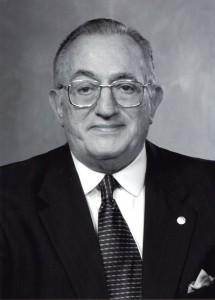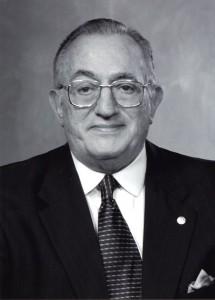
Former SLL Dean James Alatis died Feb. 28 at the age of 88.
When James E. Alatis graduated from the University of West Virginia in 1948, Georgetown was still a year away from establishing its School of Languages and Linguistics. Today, there are 105 students majoring in linguistics at Georgetown, and countless more studying foreign languages.
In his 46 years at Georgetown, Alatis served as associate dean of the SLL from 1966 to 1973, Dean of the SLL from 1973 to 1994, then distinguished professor of linguistics and modern Greek until his retirement in 2012. Alatis died on Feb. 28 at the age of 88.
The university will be holding a memorial service for Alatis in late April.
In a campus-wide email, Provost Robert Groves shared a message from an anonymous colleague commending Alatis for his passion for language and endless kindness.
“Throughout a long and distinguished career at the university spanning 46 years, his passion and advocacy for greater prominence for and the benefits of language education were unwavering,” the email read. “Thousands in the academic community and generations of students are indebted to him for his generosity of spirit and innumerable kindnesses of one of Georgetown’s true giants.”
Alatis is credited with introducing various initiatives to Georgetown, such as the Master of Arts in Teaching English as a Second Language program, the study of sociolinguistics and the departments of Arabic, Japanese and many other languages.
Senior Associate Dean for Administration and Senior Business Manager Richard Cronin (SFS ’80, LAW ’84) served as assistant dean of the SLL during Alatis’ deanship.
Cronin said that Alatis established a tradition for language learning at Georgetown that fostered support and collaboration. He said that Alatis’ defining characteristic was a strong belief in the importance of learning a foreign language as part of a college education.
“He really thought that everybody should study languages. He would ask people if they studied a language in college, and if they said yes, he would say ‘You’re one of mine,’” Cronin said. “It was so much part of him to advance [language learning at Georgetown.] He was a booster and a cheerleader.”
Chair of the Linguistics Department Heidi Hamilton (GRD ’83, GRD ’89) first worked for Alatis when she was a graduate student, and eventually became his colleague and friend.
Hamilton said that Alatis encouraged the merging of the study of languages and that of linguistics, which significantly improved the quality of language education at Georgetown.
“He saw [learning languages] and [linguistics] to be completely intertwined,” Hamilton said. “He thought that no linguist could be a linguist without knowing high levels of language, and no language student could understand their field without a solid underpinning of linguistics. That was his vision.”
In addition to his contributions to language teaching programs at Georgetown, Alatis was a founding father of Teachers of English to Speakers of Other Languages, the largest professional organization for teachers of English as a foreign language. He served as TESOL’s executive director from its founding in 1966 until 1987, when he became executive director emeritus.
In an obituary published on TESOL’s website, Alatis was quoted as having said that his goal for the organization was to promote cross-cultural communication and understanding.
“Our kind of teaching, which accepts other peoples’ languages and cultures as equally valid to ours, is essential to cross-cultural communication, mutual exchange, social justice and ultimately, it is devoutly to be wished, world peace,” Alatis once said.
At Georgetown, Alatis led many fundraising projects that resulted in the creation of new programs in the SLL. Under his leadership, the SLL received a half-million dollar grant from the National Science Foundation in 1968 to launch its sociolinguistics program, making Georgetown one of the pioneering universities in the country to offer such a program.
Distinguished Research Professor of Linguistics Emeritus Roger Shuy was close friends with Alatis, and joined the SLL in 1968, at Alatis’ convincing, to spearhead the sociolinguistics program.
In a tribute written by Shuy, he mentioned that Alatis never ceased to push for the expansion of the study of linguistics at Georgetown.
“The new major in sociolinguistics got off to an expectedly slow start with only eight students. … [Georgetown] has since grown to [be] the premier place to study sociolinguistics, thanks to Jim’s amazing foresight,” Shuy wrote. “[Alatis] also thwarted efforts by the university to drop linguistics from the curriculum. Jim was always a staunch friend of linguistics.”
In addition to sociolinguistics, Alatis was responsible for raising funds to start and sustain various language programs, particularly of languages that were less frequently spoken.
Hector Campos, a professor of Spanish and linguistics, described Alatis as a defender of smaller language departments.
“He was a strong supporter of the small languages. For example, Portuguese had very few students at that time, and any dean would have killed the program immediately,” Campos said. “But he always pushed us and asked how we could reinforce it and make the program stronger. He was a defender of supporting [lesser spoken] languages.”
Professor of modern Greek Ismini Lamb attributed the success of the modern Greek program to Alatis, who originally introduced the program in 1966.
“He brought Modern Greek, a less commonly taught language, to Georgetown in 1966. Now, the modern Greek program is the oldest, continuously running program in North America and it is thanks to Dr. Alatis.”
After the SLL was absorbed into the College in 1995 and its faculty formed the Faculty of Languages and Linguistics, Alatis remained as a professor of modern Greek, and often demonstrated his deep belief in the inseparability of language learning and cultural immersion in his classes.
When he first arrived at Georgetown, Campos audited Alatis’ modern Greek class.
“He would always teach performing dance for the students, even though he was old. He had to be 70-something at that point, but he would still dance for the students and show them Greek dance,” Campos said. “And at the end of the term, he would invite all the students in the program to a Greek restaurant, where everyone had to dance. He would be the first one to go with his wife and start dancing.”
According to Lamb, Alatis persisted with teaching Greek despite his many commitments and frequent business trips, which indicated his passion for language teaching.
“He travelled far and wide on long, long trips. Some of the [flights] would be overnight, and he would come straight here from the airport, ready to teach his Greek class,” Lamb said. “I would say ‘I can teach it for you, you had the long flight and fundraising [to do].’ He said, ‘Oh no. I wouldn’t miss teaching Greek for the world, I would pay to teach Greek!’ … His joy of teaching Greek was contagious.”
Beyond his significant contributions to the language and linguistics programs at Georgetown, Alatis is remembered by many members of the community for being a supportive and caring mentor.
University professor Deborah Tannen, who joined the linguistics department in 1979, is one of the many faculty members who was hired under Alatis’ leadership.
Tannen said that Alatis was always hugely supportive of faculty members in pursuing their research efforts, particularly with his leadership over the Georgetown University Round Table on Languages and Linguistics. On a personal level, Tannen remembered Alatis’ genuine care for the well-being of his friends and colleagues.
“He was always very interested in other people. It might be part of his Greek background,” Tannen said. “He always approached people [and] in particular was interested in what was happening to people’s personal lives. So when you were having troubles, he would always offer to help.”
Hamilton described that above all, Alatis’ legacy was in sharing his love for languages with the Georgetown community.
“He’s an overly generous person, intensely and fiercely loyal to Georgetown and the teaching of languages,” Hamilton said. “He was someone with such personality, a larger-than-life person who just exuded enthusiasm for language students and faculty.”
Campos, who was also hired by Alatis, recounted that Alatis’ warmth was evident even from the first time the two met.
“When I came for my interview [to be a professor], he was the dean. … At the very end of the interview, [I told him] I knew a little Greek. He asked me what I knew in Greek … and I recited a poem. Tears started coming out from his eyes. He said, ‘I heard that from my grandmother.’ So when the chair of the department comes to get me [after the interview], here’s the dean that everyone was afraid of, and he was giving me a hug,” Campos said.





















